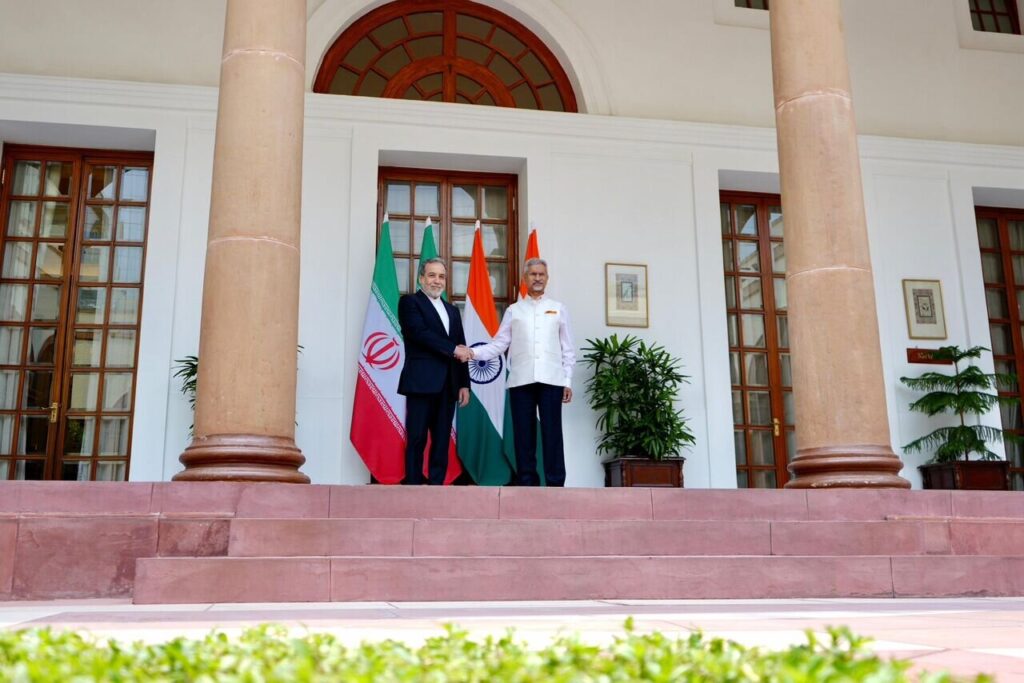Tehran – Foreign Ministers of India and Iran convened in New Delhi for the 20th meeting of the Joint Committee of India and Iran, with a series of high-level diplomatic engagements aimed at strengthening long-standing bilateral relations and addressing shared regional concerns.
The talks against the backdrop of growing tensions in South Asia featured candid discussions on economic cooperation, regional security and evolving geopolitical landscapes.
India’s Foreign Minister Subrahmanyam Jaishankar highlighted the depth and strategic value of India-Iranian relations and welcomed Iran’s Foreign Minister Abbas Araguchi and his accompanying delegation. With the establishment of the joint committee, Jaishankar highlighted the widespread progress achieved in recent years, noting that cooperation has expanded in multiple sectors, but that coordinated attention and action is still needed in some areas.
“We’ve seen great progress in our collaboration over the past few years, but the challenges remain,” Jaishankar said. “Our recent consultations – a meeting between Indian Prime Minister Narendra Modi and Iranian President Masuud Pezeshkian at the 2024 Kazan Summit and their calls on April 26th set a clear roadmap on how we can move forward.”
Marking an important milestone in diplomatic history, Jaishankar referenced the 75th anniversary of the establishment of formal diplomatic relations between New Delhi and Tehran. “This isn’t just a symbolic opportunity,” he said. “It reflects the deep friendship and enduring partnership between us and our nation. It is built on mutual respect, shared values and a common vision for the future.”
The main focus of the debate was Kashmir’s recent security crisis. “Our response was proportional to the subject,” Jaishankar emphasized. “India is not seeking escalation, but there is no doubt. Further attacks will be filled with solid, decisive responses.”
Recognizing his role as Iran’s close regional partner, he urged Tehran to have a clear understanding of India’s national security order. “As a neighbor and trustworthy friend, it is important that Iran is fully aware of the gravity of this situation and the measurement approach to dealing with it,” he said.
In response, Iranian Foreign Minister Araguchi expressed his gratitude for his warm acceptance and acknowledged the historical importance of bilateral relations. He emphasized Iran’s interest in expanding economic cooperation with India despite the sustained challenges posed by international sanctions.
“Our relationships are based on history and maintained by mutual respect and shared interests,” Araguchi said. “The current level of economic involvement is commendable, but primarily due to external restrictions. But we are optimistic due to the decision and coordination that we can overcome these barriers.”
Later that day, Jaishankar took him to social media platform X (formerly Twitter) to summarise the results of the meeting, saying, “Today, today of the 20th Joint Committee of India and Iran, I co-chaired with Foreign Minister Abbas Araguchi. Future outlook.”
Bilateral, regional and global issues discussed at broader conferences
Araguchi’s visit to India included a series of sideline meetings with senior Indian officials, reflecting the multidimensional nature of the bilateral agenda.
On Thursday afternoon he met with Indian President Droupadi Murmu at Rashtrapati Bhavan. The discussions during the conference focused on deepening cooperation across political, economic and cultural spheres. Both sides reaffirmed their commitment to further strengthening relationships based on mutual trust and long-term strategic interests.
Iran’s Foreign Minister also held an important meeting with India’s national security adviser, Ajit Doval. The consultation covers the latest regional and international security developments, highlighting the urgent need for both sides to avoid escalation and promote dialogue to effectively manage the crisis.
According to a statement released by Iran’s Foreign Ministry, Aragut reiterated Tehran’s view that peace and stability in South Asia is essential not only for regional prosperity but also for global security. He expressed his hope that all parties involved in the current tensions act responsibly and pursue de-escalation through diplomacy.
Araguchi arrived in New Delhi on Wednesday evening at the head of a senior level diplomacy and economic delegation. Addressing journalists upon arrival, he said the main purpose of the visit was to convene a long-term planned joint economic committee with an emphasis on reviving the trade and investment links.
“The visit includes some senior officials from Iranian economic ministries,” he said. “We are here to explore practical paths to expand bilateral trade and cooperation in other sectors of energy, infrastructure, transportation and mutual benefit.”
He further emphasized the strategic importance of India-Iranian dialogue in navigating regional complexities. “Political consultations with India have always been close and constructive. These conversations are even more important in light of recent regional development.”
Commenting on the broader geopolitical context, Aragut pointed out that Iran supports efforts aimed at alleviating tensions. “Iran has consistently advocated detention and dialogue, and we believe that mutual understanding and diplomatic engagement are key to ensuring regional stability.

